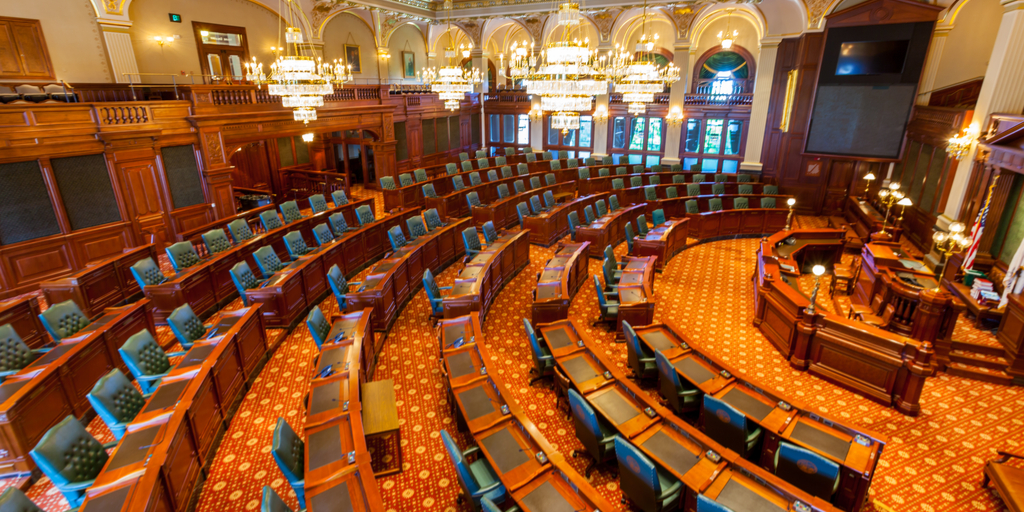Demography is only destiny if we allow it to be, by accepting the left’s transformation of culture.
Sweet Irony: Illinois Legislature Needs Trump Judges to Require Release of Trump’s Income Tax Returns
The Illinois state Senate approved a bill last week that would require presidential candidates to release their U.S. income tax returns in order to be listed on the Illinois ballot. The bill now moves to the Illinois House of Representatives for consideration. Legislators introduced similar bills in seventeen other states after President Trump’s election. If actually adopted, the law would almost certainly be unconstitutional under the 1995 case of U.S. Term Limits Inc. v. Thornton. Still, enough differences exist between presidential and congressional elections to leave a tiny crack open for states to impose the requirement constitutionally.
U.S. Term Limits concerned an Arkansas constitutional amendment, adopted by popular initiative. It prohibited listing any candidate for the U.S. Senate or House of Representatives on the state’s ballot who already served three terms in the House or two terms in the Senate. (The measure nonetheless permitted ballot-restricted candidates to continue to receive votes and win elections if they received enough write-in votes.)
U.S. Term Limits in turn relied heavily on the 1969 case of Powell v. McCormack. In this case the House of Representatives, on a majority vote, refused to seat an elected House member (Adam Clayton Powell) due to allegations of mis-, mal-, and nonfeasance.
While each chamber has the constitutional authority to expel a member on a two-thirds vote (Art. 1, sec. 5, cl 2) the Constitution does not authorize either chamber to refuse to seat otherwise duly elected candidates. The U.S. Supreme Court held Powell’s exclusion by the House unconstitutional as an attempt to add qualifications for the office beyond those imposed by the U.S. Constitution—that House members be at least 25 years old, be a citizen for at least seven years, and reside in the state which elected them.
The question in U.S. Term Limits revolved around the application of the Powell decision to state actions. That is, whether states could constitutionally impose additional qualifications for national candidates-level in their elections even though Congress could not. Justice Thomas, joined by Rehnquist, O’Connor and Scalia, hotly contested the extension of Powell from Congress to the states. In a lengthy dissent, Thomas argued the Constitution’s qualification requirements limited only Congress from adding qualifications and did not similarly limit states from adding qualifications for national office for candidates from their states.
Despite Thomas’s extended argument, a five-justice majority in U.S. Term Limits extended Powell to include state-level actions. The Court essentially held the interpretive principle, expressio unius est exclusio alterius (the expression of one thing is the exclusion of the others) limited states as well as Congress from adding qualifications for national office to those expressly stated in the Constitution.
Subsequent extension of the holding in U.S. Term Limits from qualifications for Congress to qualifications for President would seem a short step. Still, the Constitution stipulates different processes for state involvement in congressional elections relative to state involvement in presidential elections. These differences leave a tiny crack open for approving state-imposed limitations on presidential candidates that would be unconstitutional for congressional candidates.
This difference almost certainly would not extend to what the Illinois Senate proposes to do in Senate bill SB 0145. In the bill the state would limit ballot access of presidential candidates in a way that replicates the limitation struck down in U.S Term Limits.
The only realistic shot a state would have to require the release of income tax returns for presidential candidates would be to employ a process over which the Constitution expressly give states authority. State authority over the appointment of Electors to the Electoral College is one such process.
The Constitution expressly allows states to decide the “manner” in which they appoint their electors. Article II (section 1, clause 2) provides:
Each State shall appoint, in such Manner as the Legislature thereof may direct, a Number of Electors, equal to the whole Number of Senators and Representatives to which the State may be entitled in the Congress: but no Senator or Representative, or Person holding an Office of Trust or Profit under the United States, shall be appointed an Elector.
States could argue this explicit requirement for states to appoint Electors for the Electoral College “in such manner as the legislature . . . may direct” provides authorization for states to add qualification for presidential candidates that they lack regarding congressional qualifications.
A law might direct something akin to this: “The legislature authorizes appointment of Electors by the state for presidential candidates who have released U.S. income tax forms for the last five years.”
It would be a shot. Still, I doubt the argument would work.
“Manner” is too weak a word—and it pretty clear relates more to how Electors are appointed, not to which Electors are appointed. More critically, the Constitution itself lists the qualifications to be an Elector in the Electoral College. It’s in the last clause quoted above: “no Senator or Representative, or Person holding an Office of Trust or Profit under the United States, shall be appointed an Elector.”
Applying the same expressio unius rationale applied in Powell and U.S. Term Limits would then limit a state from adding to qualifications for Electoral College Electors, thereby preventing states from using the constitutional authority they have over appointments to the Electoral College to force release of income tax returns for presidential candidates.
The funny thing, though, is that Illinois SB0145 would likely be constitutional had the Court’s four conservative dissenters prevailed in U.S. Term Limits. The Illinois Senate wants to force release of President Trump’s income tax returns to prevent his reelection and, with it, to prevent appointment of more Trump justices and judges to the nation’s courts. The sweet irony is this: It is Trump judges who would allow states to do just what the Illinois Senate wants to do in SB0145 as it seeks to prevent Trump’s reelection.


